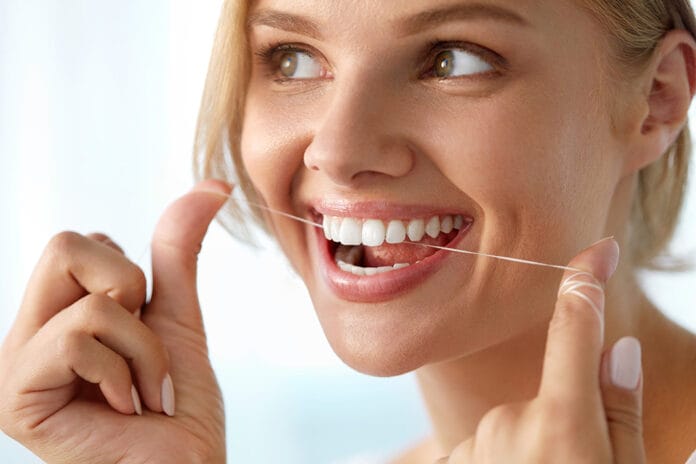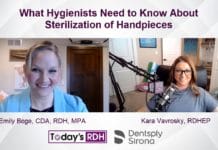The path to good oral health is a complicated process, and it is one that requires proper motivation, skills, and habits ‒ all of which can often seem impossible to achieve. Different opinions and research exist about the most successful home care methods, and most of these approaches depend on proper human performance.
For example, some research addresses this dilemma with an emphasis on the benefits of utilizing the correct tools, such as interdental cleaners and toothbrushes, and focuses on educating the public on the proper skills needed for these products. Others state that approaching oral hygiene barriers may best be done by focusing more on a theoretical framework and the personal dynamics of habit change instead of simply teaching the correct techniques.
While habits and skills are important, a key element within both approaches must be accounted for when achieving optimum success. That element is the inevitability of human error. As technology advances, more emphasis is being placed on developing inventions that can cancel out the mistakes of individuals (think of self-driving cars as an example). Using this same approach with oral home care, focusing on high-tech innovation, could bring about the potential for significantly healthier teeth and gingiva for future generations.
Identifying Barriers to Oral Health
While focusing on learning the proper skills to brush and clean interdentally seems like an effective option to achieve oral health, several barriers can inhibit optimal results. One such hindrance is the factor of individual dexterity.
According to a peer-reviewed study in the Journal of Dental Hygiene, the effectiveness of mechanical plaque control devices can largely depend on individual manual dexterity levels.1 This claim is backed by a 12-week study in which healthy adult volunteers with evidence of gingivitis were randomized into four treatment groups, each with different levels of home care, such as just brushing or brushing and flossing combined. The results showed a direct correlation between flossing effectiveness and dexterity scores within the Purdue Pegboard Test (PPT) guidelines.
Another common barrier is the oral hygiene educational aspect. While expecting to learn proper oral home care skills from a patient’s dental clinician seems reasonable, the “Oral Hygiene in Adolescence: A Questionnaire-Based Study” shows that education on oral hygiene for adolescents at home came only from their parents for 61% of the whole sample, and the majority of adolescents did not learn about oral hygiene from a dental specialist.2
Although dental clinicians are trained and expected to educate each patient consistently, time limitations, personal fatigue, and client willingness can all affect the likelihood of that compliance with the instruction occurring. Regardless of whether that instruction occurs between clinician and patient, there is insufficient evidence to suggest that any specific type of one‐to‐one oral hygiene advice is more effective than another regarding oral health.3
An additional hindrance is cognitive difficulties, such as those with autism spectrum disorder (ADS). Patients with cognitive difficulties show to be at a higher risk for dental complications and may need assistance with oral hygiene practices due to the nature of the condition itself.4
Attempting to Change Habits
Alternately, many choose to pursue the idea that learning how to develop a proper habit is the best way forward in effective oral home care due to healthy habits are often difficult to form for most of the general public. In an article for the Community Dentistry and Oral Epidemiology journal, four dental hygienists conducted several different rounds of audiotaped and transcribed counseling sessions with 31 schoolchildren. The results showed that nearly every child needed some sort of change to their current hygiene habits. The clinicians were able to effectively demonstrate the current difficulty in changing habit patterns in children and how that affects oral health.5
This was proven to be the case not only with children but with the geriatric population as well as shown by the study, “The Association of Frailty with Oral Cleaning Habits and Oral Hygiene Among Elderly Home Care Clients.” This study revealed that the geriatric population who fall under the frailty category would greatly benefit from external support to maintain proper oral hygiene habits due to 62% of 231 participants having poor oral hygiene habits and few remaining teeth.6
A study published in the Journal of Human Growth and Development asserts that social factors, such as living with both parents in the same home, regularly attending school, consistently having access to a toothbrush, and the ability to regularly see a dentist also significantly affect the adoption of positive oral hygiene habits, creating the need for a more comprehensive approach to the perspective of health inequalities.7
It is clear that properly caring for one’s oral health is a difficult and involved process, and it requires motivation to develop the correct habits and skills, both of which are no easy feat. For the general public ‒ especially children, the geriatric population, and those with special needs ‒ to effectively brush and clean interdentally daily, it takes challenging dexterity, extensive knowledge of proper methods, diligent habits, and potentially extra assistance from another, such as a caretaker or parent.
Expecting these factors to fall into place for every individual is unrealistic at best due to the inevitability of human error. This leads to the conclusion that the most effective way forward is to focus on products and methods that can cancel out human error.
New technology is beginning to come forward that is moving in this direction. One example is news coming from a team at the University of Pennsylvania that is developing shape-shifting iron oxide nanoparticle microrobots that could form around the shape of the teeth magnetically to sweep away dental plaque.8
As the philosopher and historian Thomas Carlyle pointed out, “The greatest mistake is to imagine that we never err.” Utilizing advanced technology to create a product or process that thoroughly cleans the teeth and gingiva daily at home for the individual in the same way that self-driving cars will drive the vehicle for the person would most likely bring about an increase in oral health that has not been achievable before.
Before you leave, check out the Today’s RDH self-study CE courses. All courses are peer-reviewed and non-sponsored to focus solely on high-quality education. Click here now.
Listen to the Today’s RDH Dental Hygiene Podcast Below:
References
- Milleman, K., Milleman, J., Bosma, M.L., et al. Role of Manual Dexterity on Mechanical and Chemotherapeutic Oral Hygiene Regimens. Journal of Dental Hygiene. 2022 Jun; 96(3): 35-45. PMID: 35654566. https://jdh.adha.org/content/jdenthyg/96/3/35.full.pdf
- Sbricoli, L., Bernardi, L., Ezeddine, F., et al. Oral Hygiene in Adolescence: A Questionnaire-based Study. International Journal of Environmental Research and Public Health. 2022 Jun 16; 19(12): 7381. DOI: 10.3390/ijerph19127381. PMID: 35742630; PMCID: PMC9223832. https://doi.org/10.3390/ijerph19127381
- Soldani, F.A., Lamont, T., Jones, K., et al. One‐to‐one Oral Hygiene Advice Provided in a Dental Setting for Oral Health. Cochrane Database of Systematic Reviews. 2018: 10(10): CD007447. DOI: 10.1002/14651858.CD007447.pub2. https://pubmed.ncbi.nlm.nih.gov/30380139/
- Orellana, L.M., Cantero-Fuentealba, C., Schmidlin-Espinoza, L., Luengo, L. Oral Health, Hygiene Practices and Oral Habits of People with Autism Spectrum Disorder. Revista Cubana de Estomatolog. 2019; 56(3). https://www.medigraphic.com/cgi-bin/new/resumenI.cgi?IDARTICULO=93726
- Kasila, K., Poskiparta, M., Kettunen, T., Pietilä, I. Oral Health Counselling in Changing Schoolchildren’s Oral Hygiene Habits: A Qualitative Study. Community Dentistry and Oral Epidemiology. 2006; 34(6): 419-428. https://doi.org/10.1111/j.1600-0528.2006.00288.x
- Tuuliainen, E., Nihtilä, A., Komulainen, K., et al. The Association of Frailty with Oral Cleaning Habits and Oral Hygiene among Elderly Home Care Clients. Scand J Caring Sci. 2020 Dec; 34(4): 938-947. DOI: 10.1111/scs.12801. Epub 2019 Dec 17. PMID: 31845365. https://doi.org/10.1111/scs.12801
- Malacarne Zambaldi, M.P., del Camem Bisi Molina, M., Guidolini Martinelli, K., dos Santos-Neto, E.T. Children, Maternal and Socioeconomic Characteristics Influence Oral Hygiene Habits in Schoolchildren. Journal of Human Growth and Development. 2022; 32(2): 202-213. https://doi.org/10.36311/jhgd.v32.13163
- Proof of Concept: Shapeshifting Microbots Ability to Brush and Floss Teeth. (2022, November 18). Today’s RDH. https://www.todaysrdh.com/proof-of-concept-shapeshifting-microbots-ability-to-brush-and-floss-teeth/












